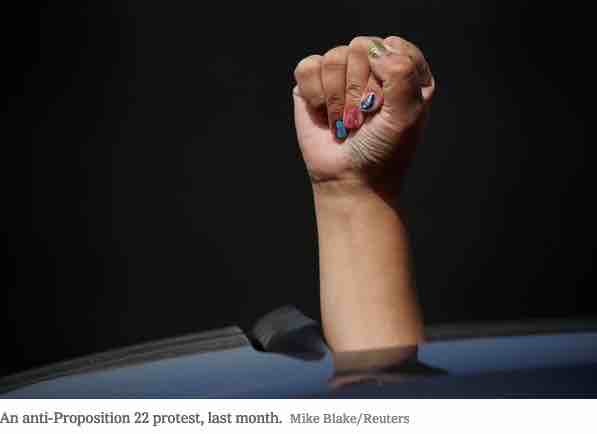What happened in California? Despite the state’s liberal reputation, voters there last week approved Proposition 22, a ballot initiative exempting many gig companies from state workplace laws and stripping their workers of basic, essential protections.
Uber, Instacart, Lyft, DoorDash and other on-demand providers of ride-shares and food and grocery deliveries spent $200 million pushing the proposal, an astounding sum that workers and their allies couldn’t remotely hope to match. Not surprisingly, Californians were misled by an avalanche of claims about the proposal’s impact on workers. The measure, which takes effect next month, was approved with 58 percent of the vote.
Emboldened by the results in California, Uber and friends are apparently planning to take the show on the road. Potential targets could include Massachusetts or New Jersey, where state regulators have pursued them, or New York or Pennsylvania, where courts have rejected the argument by gig companies that workers run their own independent businesses. The rest of us need to understand what happened in California.
What was at stake with Proposition 22 was whether workers for app-based driver and delivery companies would be considered employees under California statutes, which like workplace laws nationwide, cover only employees, or whether they should be classified as independent contractors. Proponents argued that requiring gig companies to follow current laws would badly damage their on-demand business model and result in longer wait times, higher prices and the loss of countless jobs. These were the same bleak prognostications gig companies made about the minimum wage for drivers that New York City enacted two years ago — predictions that did not come to pass.
What they didn’t say was that it was a terrible deal for workers. Allowing companies to write their own exemption from California law is also a cautionary tale for our fragile democracy.
Now, workers for these gig companies in California will not have a right, as employees do under state law, to paid sick days, overtime pay, unemployment insurance or a workplace covered by occupational safety and health laws.
How did these companies convince California voters to approve this snatching of rights from thousands of vulnerable people? They used a deluge of money to convince voters that the proposal served workers’ interests by preserving their flexibility, ensuring a guaranteed level of pay and providing them with “portable” benefits.
Their claims were deceptive.




